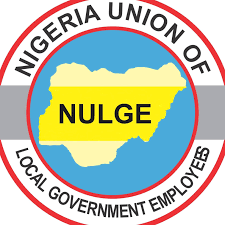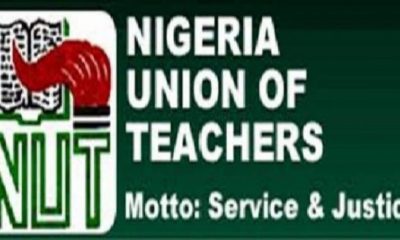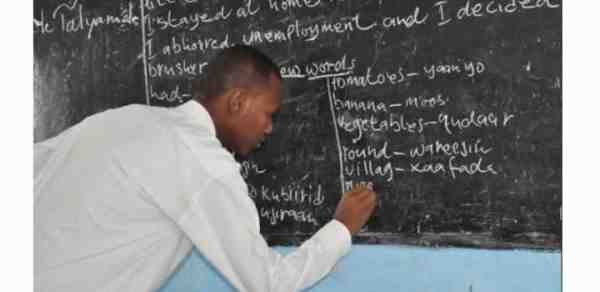Education
IPPIS: ASUU Threatens Strike If Not Paid

From Chris Gaga, Makurdi
The Academic Staff Union of Universities (ASUU) has threatened imminent industrial action if the Federal Government goes ahead to stop their salaries.
Chairman of ASUU, Federal University of Agriculture Makurdi branch, Dr.
“If the Federal government stops our salaries
because of the Integrated Personnel and Payroll Information System, IPPIS, the
following minute we will down tool, because the principle is ‘no pay no work.
“Federal government is claiming to be discussing
with us and they are invoking punishment, so you can’t say that is
discussion.
The National Resource Person for ASUU, Comrade
Alex Odiyi who was in FUAM on yesterday said the visit was to encourage it’s
members not to give up the refusal of the Federal government IPPIS.
Comrade Odiyi disclosed that the national body
of ASUU has already resolved to activate the “no pay, no work slogan
should the Federal government did not pay their salaries before Monday 3rd
February.
The Resource Person re-emphasized that
government was only interested in abolishing the autonomy that the University
enjoys, reiterating that ASUU has provided a viable alternative to IPPIS if
government was ready to fight corruption as it claims.
“The University System is Unique in it’s
own rights, so that been the case, we told them that even if government is
saying that they want to fight corruption, we have an alternative that we have
proposed that will stop corruption or expose it. So in rejecting it, we
have provided an alternative, that this is what we have,” Comrade Odiyi said.
ASUU have in rejection of the Integrated
Personnel and Payroll Information System, (IPPIS), asked the federal government
to adopt its proposed University Transparency and Accountability Solution
(UTAS), which according to them means the same thing with IPPIS
Education
FG unveils interest-free loan for tertiary institution workers

By Tony Obiechina Abuja
The Federal Government has unveiled the Tertiary Institutions Staff Support Fund (TISSF), an interest-free loan scheme designed to improve the welfare, professional growth, and financial stability of Nigeria’s tertiary institution workforce.
The Minister of Education, Dr.
Tunji Alausa, who unveiled the initiative in Abuja on Thursday, described it as a strategic empowerment platform that would give both academic and non-academic staff the financial support they needed to serve students with renewed dedication and live with dignity.The minister further explained that TISSF is an integral part of President Bola Tinubu’s Renewed Hope Reform Agenda for the education sector, which prioritises people as the nation’s greatest asset in transforming the education sector and driving economic growth.
According to him, the programme is a joint initiative of the Federal Ministry of Education and the Tertiary Education Trust Fund (TETFund), implemented in partnership with the Bank of Industry (BoI).
Under the scheme, beneficiaries can access interest-free loans for medical expenses, family and accommodation needs, transportation (including electric vehicles and CNG conversions), small-scale enterprises and agriculture, as well as academic advancement through certifications and capacity-building programmes.
The Minister said; “TISSF is more than a financial product; it is a workforce transformation tool. By easing financial burdens, we expect to improve staff retention, boost morale, and enhance institutional performance for better student outcomes.”
Eligibility, he said, covers confirmed full-time staff of all federal universities, polytechnics, and colleges of education, along with one state-owned institution in each category per state, while applicants must have at least five years to retirement and be members of recognised staff unions such as ASUU, NASU, COEASU, and SSANIP. This translates to 248 eligible institutions nationwide.
“Each eligible staff member can access up to N10 million, subject to a cap of 33.3% of their gross annual salary. The loans are interest-free, repayable over five (5) years, with 12 months moratorium before repayment begins,” the Minister added.
Education
FG reaffirms zero tolerance for exam malpractice

By Tony Obiechina Abuja
The Minister of Education, Dr. Olatunji Alausa has reaffirmed the Federal Government’s commitment to transparency, accountability, educational excellence, and zero tolerance for examination malpractice.
In a statement by Mrs Folashade Boriowo Director of Press and public relations, Alausa spoke against the backdrop of the 2025 WAEC results released recently.
According to official statistics from WAEC, the percentage of candidates who obtained five credits with or without English Language and Mathematics rose to 91.
14% in 2025, compared to 73.79% in 2024 and 84.38% in 2023.However, candidates securing five credits including English Language and Mathematics stood at 62.
96% in 2025, down from 72.12% in 2024 and 79.81% in 2023.Reiterating the Federal Government’s zero-tolerance policy towards examination malpractice, Dr. Alausa highlighted the consistent decline in malpractice rates over the past three years—from 16.29% in 2023 to 11.92% in 2024, and 9.70% in 2025.
He attributed this progress to robust anti-malpractice measures introduced by WAEC, including the serialization of question papers in key subjects such as English Language, Mathematics, Biology, and Economics.
The Minister emphasized the government’s resolve to build human capacity through continuous teacher training and support.
“We are committed to producing smart, competent teachers to better prepare our students for academic success. This is crucial to ensuring that our examinations remain credible and flawless,” he said.
According to him, going forward, the Ministry will roll out Computer-Based Testing (CBT) for WAEC and NECO objective papers in 2025, and for both essay and objective papers in 2026. This step is aimed at enhancing efficiency, curbing malpractice, and aligning Nigeria’s examination system with global best practices.
Dr. Alausa called on all stakeholders, including parents, guardians, teachers, and community leaders, to support students, encourage discipline, and create enabling environments for learning.
“Let us work together to ensure that every hardworking child has the opportunity to succeed,” he urged.
Education
Varsity Don Advocates Establishment of National Bureau for Ethnic Relations, Inter-Group Unity

By David Torough, Abuja
A university scholar, Prof. Uji Wilfred of the Department of History and International Studies, Federal University of Lafia, has called on the Federal Government to establish a National Bureau for Ethnic Relations to strengthen inter-group unity and address the deep-seated ethnic tensions in Nigeria, particularly in the North Central region.
Prof.
Wilfred, in a paper drawing from years of research, argued that the six states of the North Central—Kwara, Niger, Kogi, Benue, Plateau, and Nasarawa share long-standing historical, cultural, and economic ties that have been eroded by arbitrary state boundaries and ethnic politics.According to him, pre-colonial North Central Nigeria was home to a rich mix of ethnic groups—including Nupe, Gwari, Gbagi, Eggon, Igala, Idoma, Jukun, Alago, Tiv, Birom, Tarok, Angas, among others, who coexisted through indigenous peace mechanisms.
These communities, he noted, were amalgamated by British colonial authorities under the Northern Region, first headquartered in Lokoja before being moved to Kaduna.
He stressed that state creation, which was intended to promote minority inclusion, has in some cases fueled exclusionary politics and ethnic tensions. “It is historically misleading,” Wilfred stated, “to regard certain ethnic nationalities as mere tenant settlers in states where they have deep indigenous roots.”
The don warned that such narratives have been exploited by political elites for land grabbing, ethnic cleansing, and violent conflicts, undermining security in the sub-region.
He likened Nigeria’s ethnic question to America’s historic “race question” and urged the adoption of structures similar to the Freedmen’s Bureau, which addressed racial inequality in post-emancipation America through affirmative action and equitable representation.
Wilfred acknowledged the recent creation of the North Central Development Commission by President Bola Tinubu as a step in the right direction, but said its mandate may not be sufficient to address ethnic relations.
He urged the federal government to either expand the commission’s role or create a dedicated Bureau for Ethnic Relations in all six geo-political zones to foster reconciliation, equality, and sustainable development.
Quoting African-American scholar W.E.B. Du Bois, Prof. Wilfred concluded that the challenge of Nigeria in the 21st century is fundamentally one of ethnic relations, which must be addressed with deliberate policies for unity and integration.



























